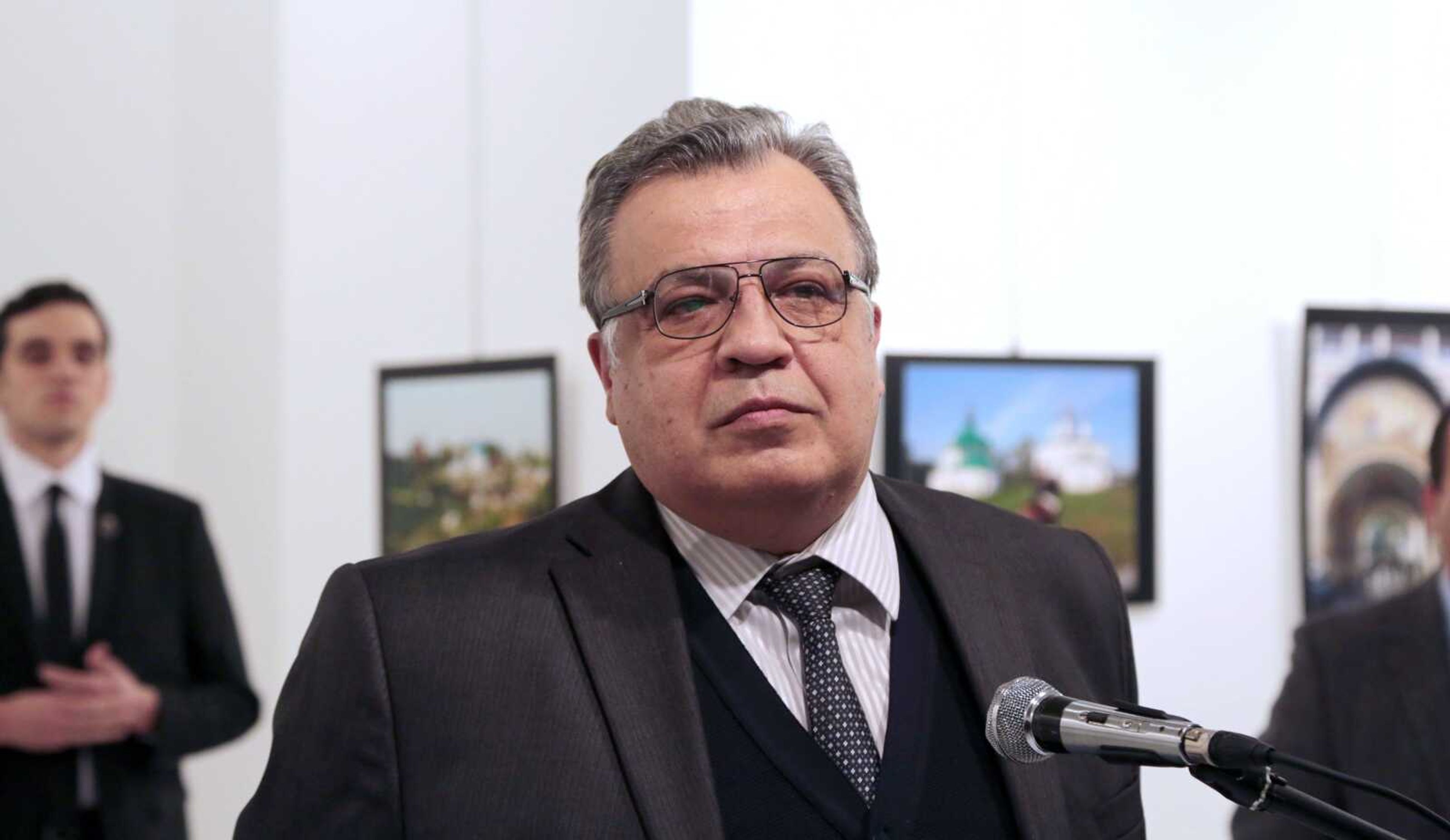Turkey, Russia probe slaying of envoy in Ankara gallery
ANKARA, Turkey -- Investigators from Turkey and Russia hunted for clues Tuesday in the assassination of Russia's ambassador to Turkey in front of stunned onlookers at a photo exhibition in Ankara. A team of 18 Russian investigators and foreign ministry officials arrived in Turkey and began inspecting the art gallery where the shooting of Andrei Karlov took place...
ANKARA, Turkey -- Investigators from Turkey and Russia hunted for clues Tuesday in the assassination of Russia's ambassador to Turkey in front of stunned onlookers at a photo exhibition in Ankara.
A team of 18 Russian investigators and foreign ministry officials arrived in Turkey and began inspecting the art gallery where the shooting of Andrei Karlov took place.
Central to the joint Turkish-Russian investigation is whether Mevlut Mert Altintas, a member of Ankara's riot police squad, planned the attack alone.
One senior Turkish government official, who spoke on condition of anonymity because he was not authorized to release details to the press, said it was unlikely Altintas acted alone.
The official said the killing had the marks of being "fully professional, not a one-man action."
So far, authorities have detained only people close to the gunman in their investigation: Altintas' parents, sister, three other relatives and his roommate in Ankara.
Independent Turkish security analyst Abdullah Agar said it was "likely that an organization was behind" the assassination.
The analyst said Altintas' behavior and the manner in which he carried out the attack "gives the impression that he received training that was much more than riot police training."
Agar also said the gunman's words, which he uttered in Arabic, were from a passage frequently cited by jihadists.
Altintas shouted "Don't forget Aleppo! Don't forget Syria!" in Turkish during the attack, and yelled "Allahu akbar," the Arabic phrase for "God is great." He continued in Arabic: "We are the descendants of those who supported the Prophet Muhammad, for jihad."
A Turkish Foreign Ministry official said the country's foreign minister, Mevlut Cavusoglu, provided U.S. Secretary of State John Kerry information on the assailant during a telephone conversation Tuesday.
Cavusoglu also told Kerry that Turkey and Russia "know" a movement led by U.S.-based Muslim cleric Fethullah Gulen was behind the attack, the official said, speaking on condition of anonymity in line with government rules.
Turkey has accused Gulen of orchestrating a failed military coup in July aimed at toppling President Recep Tayyip Erdogan and accuses the cleric of wanting to destabilize Turkey. It is pressing the United States to extradite Gulen to Turkey to stand trial for his alleged role in the coup attempt. Gulen has denied the accusations.
Few details about the policeman or the initial investigation have been made public. According to the state-run Anadolu news agency, Altintas took leave from work and made a hotel reservation near the art exhibition center. He checked into the hotel Monday. After the attack, police searched and sealed his hotel room, but did not announce whether anything was found there.
On arrival at the art gallery where the photo exhibition was taking place, Altintas was apparently initially stopped by security, but managed to get through with his weapon by using his police ID. The gun he used to shoot Karlov appeared to be a weapon that is standard issue for Turkey's riot police.
Originally from the western town of Soke, near Turkey's Aegean coast, Altintas had been serving in Ankara's riot police for the past two and a half years. But how or why he became impassioned with the war in Syria was unclear.
Police investigators said the policeman lived in an apartment building in Demetevler, a northern district of Ankara.
Some neighbors described him as a quiet person who kept to himself.
"He seemed to be a quiet and calm person. He was not speaking to us too much," said Halil Karan, a 22-year-old shopkeeper in the area. "We were seeing him in the evenings. He didn't come to his home for a long time though."
Some residents in the area said he mainly lived elsewhere in the capital.
Both Russia and Turkey have vowed that the assassination would not derail efforts to repair bilateral ties. Turkey and Russia have been at odds mainly over their opposing views to the conflict in Syria, with Moscow backing Syrian President Bashar Assad and Ankara supporting rebels fighting to depose him. With Russia's air support, Syrian government forces have pushed the rebels out of their last foothold in Aleppo.
Karlov's assassination came after days of protests by Turks angry over Moscow's support for Assad and Russia's actions in Aleppo.
Turkish President Recep Tayyip Erdogan said he and Russian President Vladimir Putin were "in agreement that this was an open provocation" and that a joint investigation was being conducted. The two spoke Monday night.
"Together with Mr. Putin, we have an understanding that our cooperation, especially in Syria, will not be affected by this attack," he said.
Karlov's body was flown home to Moscow on Tuesday afternoon after an emotional ceremony at Ankara Airport attended by Turkish government officials and diplomats. Karlov's wife, Marina Karlova, wept as her husband's flag-draped coffin was carried by a Turkish honor guard. She laid two red carnations on the coffin before it was loaded onto the aircraft.
On Monday evening, an Associated Press photographer and others at the art gallery watched in horror as Altintas, who was wearing a dark suit and tie, fired at least eight shots, at one point walking around the ambassador as he lay motionless and shooting him again at close range.
Connect with the Southeast Missourian Newsroom:
For corrections to this story or other insights for the editor, click here. To submit a letter to the editor, click here. To learn about the Southeast Missourian’s AI Policy, click here.









